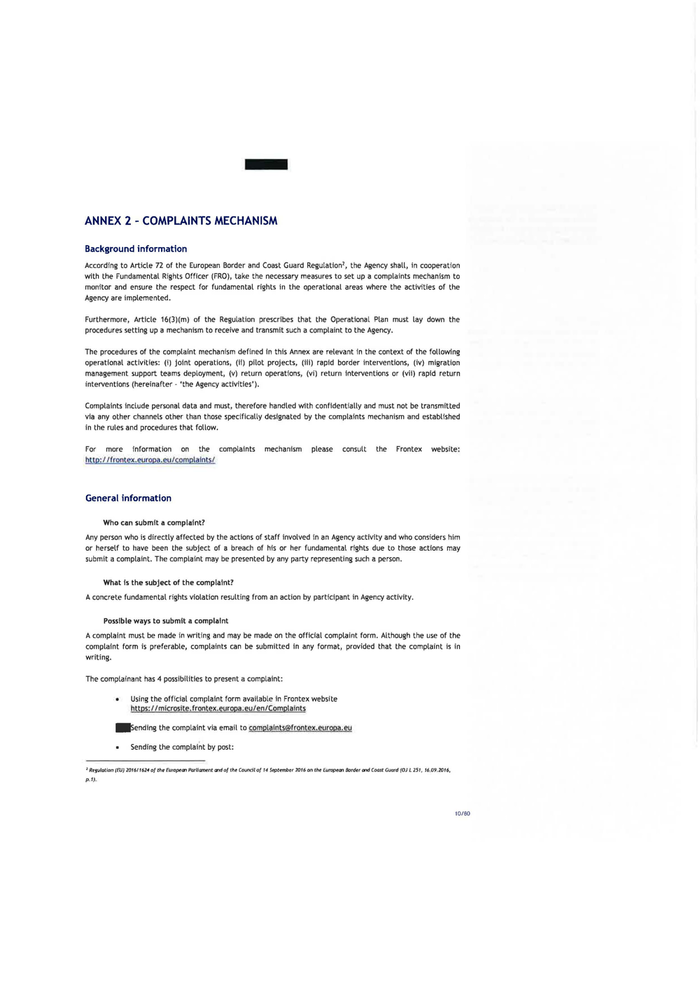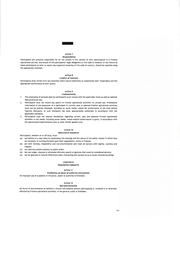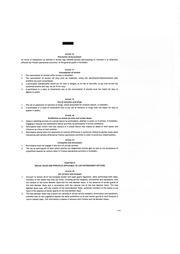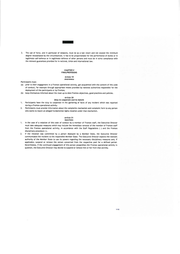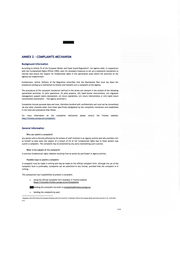annex-oplan-poseidon-2017-2018-amendment-no-1
Dieses Dokument ist Teil der Anfrage „Operational Plans for Joint Operation Poseidon 2018 and 2019“
iE FRONTEX m - EUR O PEAN 80RDER AND COA ST GUARD AGENCY Warsaw, 21/12/2017 Annexes of Operational Plan Amendment No 1 JO POSEIDON 2017 JO POSEIDON 2018 'Information which is s1nsitiVf!' "1d fimitftl for Ufe within the E:uropt!c.i Union institutions, other offices tnd 03enciu Htabfistml by virtw orotJ the basis of the Treaties, EU ~~r Statn rnd public adtnlnlstrDllons; distribution on 11 need to know basis. Not for public disseminorion Frontex - European Border and Coast Guard Agency www.frontex.europa.eu I Pl. Europejski 6, 00-844 Warsaw, Poland I Tel. +48 22 205 95 00 I Fax +48 22 205 95 01

INDEX Contents ANNEX 1 - CODE OF CONDUCT FOR ALL PERSONS PARTICIPATING IN FRONTEX ACTIVITIES 5 ANNEX 2 - COMPLAINTS MECHANISM 10 Background information 10 General Information 10 Who con submit o complaint? 10 Whot is the subject of the complaint? 10 Possible ways to submit a complaint 10 Duty to Inform 11 A hard copy of the complaint form 11 ANNEX 3 - THOUROUGH ASSESSMENT 12 ANNEX 4 - OPERATIONAL OBJECTIVES 16 ANNEX 5 - OPERATIONAL AREA 19 ANNEX 6 - DESCRIPTION OF THE TASKS AND SPECIFIC INSTRUCTIONS TO THE MEMBERS OF THE EUROPEAN BORDER AND COAST GUARD TEAMS (RULES OF ENGAGEMENT) 21 ANNEX 7 - INITIAL PLAN OF DEPLOYED RESOURCES 35 Human resources 35 Technical equipment 36 Readmission activity 36 ANNEX 8 - OPERATIONAL BRIEFING AND DEBRIEFING 38 Operational briefing 38 Operational debriefing 39 ANNEX 9 - COOPERATION WITH OTHER UNION AGENCIES AND BODIES OR INTERNATIONAL ORGANISATIONS 40 Cooperation with EASO 40 Cooperation with EFCA and EMSA 40 Cooperation with eu -LISA 41 Cooperation with Europol 41 Cooperation with EUROJUST 42 Cooperation with FRA 42 Cooperation with Interpol 42 Cooperation with UNHCR 43

Cooperation with IOM 43 Cooperation with NATO 43 ANNEX 10 - COORDINATION STRUCTURE 44 Tasks and Roles of Participants 44 Member States 44 International Coordination Centre (ICC) 44 ICC Coordinator 44 Central Police Coordinator (CPC) 45 Liaison Officer (LO) 46 Joint Coordinating Board (JCB) 46 National Official (NO) 46 Intelligence Officer (10) 47 Team members (TM) and Officers of the host MS 48 Commanding Officer (CO) 48 Interpreters 48 Local Coordination Centre (LCC) 49 LCC Coordinator 49 Local Police Coordinators (LPC) 49 Team Leaders (TL) 50 Liaison Officer - Technical Equipment (LO-TE) 51 Officers of the host Member State 51 Frontex 51 frontex Coordinating Officer (FCO) 51 Operational Manager (OM) 52 Operational Team (OT) 52 frontex Operational Coordinator (FOC) 52 frontex Support Officer (FSO) 52 Frontex Support Officer (FSO) for Readmissions 53 Frontex Support Officer (FSO) for Deployment and Logistics 53 Operational Analyst (OA) 53 Debriefing Advisers (DA) 54 Personal Data Analyst (PDA) 55 Frontex Situation Centre (FSC) 55 frontex Liaison Office/ European Union Regional Tasks Force (Piraeus) 56 Field Press Coordinator (FPC) 57 Fundamental Rights Officer (FRO) 57 Team Members seconded to the Agency (sTM) 57 ANNEX 11 - CONTACT DETAILS 58 General 58 Frontex 58 Host MS -Greece 60 Hellenic Coast Guard 60 Hellenic Police 62 Other 68 3/80

ANNEX 12 - JORA 69 JORAActors 69 JORA Reporting Structure 70 Incidents reporting structure 70 Identification and Registration reporting structure 71 Readmission activity reporting structure 71 JORA Reporting Timeline 72 ANNEX 13 - READMISSION ACTIVITY 73 General information 73 Pre-readmission phase 73 Pre-departure phase 74 Boarding I Procedures on-board 75 Arrival phase 76 Return leg 76 Tasks of the Forced-return escorts 76 ANNEX 14 - STANDARD OPERATING PROCEDURES (SOP) FOR THE COOPERATION BETWEEN NATO ACTIVITY AND FRONTEX COORDINATED OPERATION IN THE AEGEAN SEA 77 Information exchange and situation monitoring 77 Exchange of liaison officers 78 Operational planning and deployment 78 Liaison officer duties 79 Operational communication 79 ANNEX 15 - DEPLOYMENT OF TECHNICAL EQUIPMENT FROM THE UNITED KINGDOM 80 4/BO

ANNEX 1 - CODE OF CONDUCT FOR ALL PERSONS PARTICIPATING IN FRONTEX ACTIVITIES CHAPTER I GENERAL PROVISIONS Article 1 Application, scape and objectives 1. This code of conduct applies to all Frontex operational activities, including those which take place outside the territory of the Union and, subject to paragraph 2, to all persons participating in them. 2. The basic principles set out in this code of conduct should serve as a framework for persons who are seconded national experts, other law enforcement officers or officers or participants from third countries. This code of conduct is without prejudice to the provisions of any status agreement pursuant to Article 54 of the European border and coast guard regulation ( ). 3. This code of conduct aims to promote general values intended to guarantee the principles of the rule of law and respect for fundamental rights with particular focus on vulnerable persons, as well as on persons seeking international protection, and Is applicable to all persons participating in Frontex operational activities. Article 2 Definitions For the purpose of this code of conduct, the following definitions apply: (a) The term 'participant' refers to any person participating or engaged in a Frontex operational activity. (b) The term 'Frontex operational activity' means any activity coordinated, assisted, financed or co- financed by Frontex in the context of assisting Member States in undertaking border control and return tasks, in accordance with Article 8 of the European border and coast guard regulation. Frontex operational activities include joint operations, pilot projects, return operations and training of relevant staff. (c) The term 'law enforcement officers' includes members of the European Border and Coast Guard teams and/or relevant staff from the Member States and/or from third countries, who have law enforcement prerogatives. (d) The term 'vulnerable persons' may include women, children (unaccompanied or with family members), persons with disabilities, the elderly, victims of torture or trauma, persons susceptible to exploitation and victims of exploitation or trafficking in human beings. (e) The term 'Member State' also includes the Schengen associated countries. (f) The term 'discrimination' means any unequal treatment or arbitrary action or distinction based on a person's sex, race, colour, ethnic or social origin, genetic features, language, religion or belief, nationality, political or any other opinion, membership of a national minority, property, birth, disability, age or sexual orientation or other status. (g) The term 'harassment' means Intentional behaviour which is unwanted by the person to whom it is directed and which has the purpose or effect of offending that person or creating an intimidating, hostile or offensive environment. (h) The term 'social media' includes biogs, business networks, social networks, forums, photo sharing, products/services review, social bookmarking, social gaming, video sharing and virtual worlds. 5/80

CHAPTER II PRINCIPLES Article 3 Lawfulness 1. Participants must: (a) comply with international law and Union law as well as the national law of both home and host Member States; (b) meet the obligations imposed upon them by the provisions stated in the operational/implementation plan. Article 4 Fundamental rights Participants must: (a) promote, respect, fulfil and protect human dignity and the fundamental rights of every individual, regardless of their sex, race, colour, ethnic or social origin, genetic features, language, religion or belief, nationality, political or any other opinion, membership of a national minority, property, birth, disability, age or sexual orientation or other status, with particular focus on vulnerable persons; (b) ensure respect for the relevant international and European Instruments regarding fundamental rights protection, including the asylum acquis. Article 5 International protection Participants must: (a) promote, respect, fulfil and protect the right of persons seeking international protection to be identified, receive adequate nssist<mcc and be informed in an appropriate way, preferably using a number of the most common languages that third-country nationals understand or are reasonably believed to understand, about their rights and relevant procedures; (b) ensure that persons in (a) above must be referred without delay to the national authorities responsible for considering their requests, in compliance with the principle of non-refoulement, the prohibition against arbitrary and collective expulsions and the right to seek asylum; (c) ensure that persons in their custody are treated in accordance with the right to human dignity, and are provided with basic necessities, including food, water, shelter and medical attention to meet their individual needs; (d) ensure that special consideration is given to vulnerable persons as well as to persons seeking international protection. Article 6 Performance of duties Participants must: (a) ensure that instructions, directives and required duties given to them are carried out promptly and in accordance with the training received on the protection of fundamental rights; (b) display that they are on a Frontex operational activity, unless such transparency would compromise either their personal safety or duly justified operational objectives; (c) use resources put at their disposal responsibly and avoid unnecessary waste: such resources may include mobile offices, cars, computers or phones. 6/00

Article 7 Responsibility Participants are primarily responsible for all the actions in the context of their participation in a Frontex operational activity. Any breach of the participants' legal obligations or this code of conduct, or any failure by those participants to refer or report any suspected breaches of this code of conduct, should be reported using the appropriate channels. Article 8 Conflict of interests Participants must refrain from any activities which would undermine or compromise their impartiality and the appropriate performance of their duties. Article 9 Confidentiality 1. The processing of personal data by participants must comply with the applicable Union as well as national data protection law. 2. Participants must not record any aspect of Frontex operational activities for private use. Professional information in the possession of a participant in current, past or planned Frontex operational activities must not be publicly disclosed, including on social media, unless the performance of the duty strictly requires disclosure, or such disclosure has been appropriately authorised in accordance with the applicable standards. 3. Participants must not express themselves regarding current, past and planned Frontex operational activities in the media, including social media, unless explicit authorisation is given, in accordance with the operational/implementation plan or other similar agreed rules. Article 10 Behavioural Standards Participants, whether on or off duty, must: (a) not behave in a way likely to compromise the prestige and the nature of the public mission in which they are invested, or to bring discredit upon their organisation, entity or Frontex; (b) act with fairness, impartiality and non-discrimination and treat all persons with dignity, courtesy and respect; (c) not take any actions contrary to public order; (d) not use vulgar, obscene or otherwise offensive speech or gestures that could be considered abusive; (e) not be ignorant of cultural differences when interacting with persons so as to cause misunderstandings. CHAPTER Ill PROHIBITED CONDUCTS Article 11 Prohibition of abuse of authority and position All improper use of a position of influence, power or authority is forbidden. Article 12 Non-Discrimination All forms of discrimination as defined in Article 2(f) towards persons participating in , involved in or otherwise affected by Frontex operational activities, or the general public is forbidden . 7160

Article 13 Prevention of harassment All forms of harassment as defined in Article 2(g) towards persons participating in, involved in or otherwise affected by Frontex operational activities, or the general public is forbidden. Article 14 Consumption of alcohol 1. The consumption of alcohol while on duty is forbidden. 2. The consumption of alcohol off duty must be moderate, unless the operational/implementation plan prohibits any such consumption. 3. A participant unexpectedly called out for duty is obliged, at no risk of discredit, to say that he/she has consumed alcohol and may not be flt for duty. 4. A participant in a state of intoxication due to the consumption of alcohol must not report for duty or appear in public. Article 15 Use of narcotics and drugs 1. The use or possession of narcotics or drugs, unless prescribed for medical reasons, is forbidden. 2. A participant in a state of intoxication due to the use of narcotics or drugs must not report for duty or appear in public. Article 16 Prohibition on sexual services and sexual abuse 1. Using or soliciting services of a sexual nature by participants, whether in public or in private, is forbidden. Engaging in abusive and exploitative sexual activities by participants is strictly prohibited. 2. Participants shall refrain from any conduct of a sexual nature that implies an abuse of their power and influence by virtue of their position. 3. Participants should show full awareness of cultural differences in particular related to gender issues when Interacting with persons affected by Frontex operational activities in order to avoid any misperceptions. Article 17 Corruption and misconduct 1. Participants must not engage in any form of corrupt activity. 2. The use by participants of their public position for illegitimate private gain as well as the acceptance of unjustified rewards for actions taken In Frontex operational activities is forbidden. CHAPTER IV SPECIAL RULES AND PRINCIPLES APPLICABLE TO LAW ENFORCEMENT OFFICERS Article 18 Use of force and weapons 1. Pursuant to Article 40 of the European border and coast guard regulation, while performing their tasks, members of the teams may only use force, including service weapons, ammunition and equipment, with the consent of the home Member State and the host Member State, In the presence of border guards of the host Member State and in accordance with the national law of the host Member State. The host Member State may, with the consent of the home Member State, authorise members of the teams to use force in the absence of border guards of the host Member State. 2. The host Member State may prohibit the carrying of certain service weapons, ammunition and equipment, provided that its own legislation applies the same prohibition to its own border guards or staff involved in return-related tasks. This information is shared in advance with Frontex and the Member States. B/80
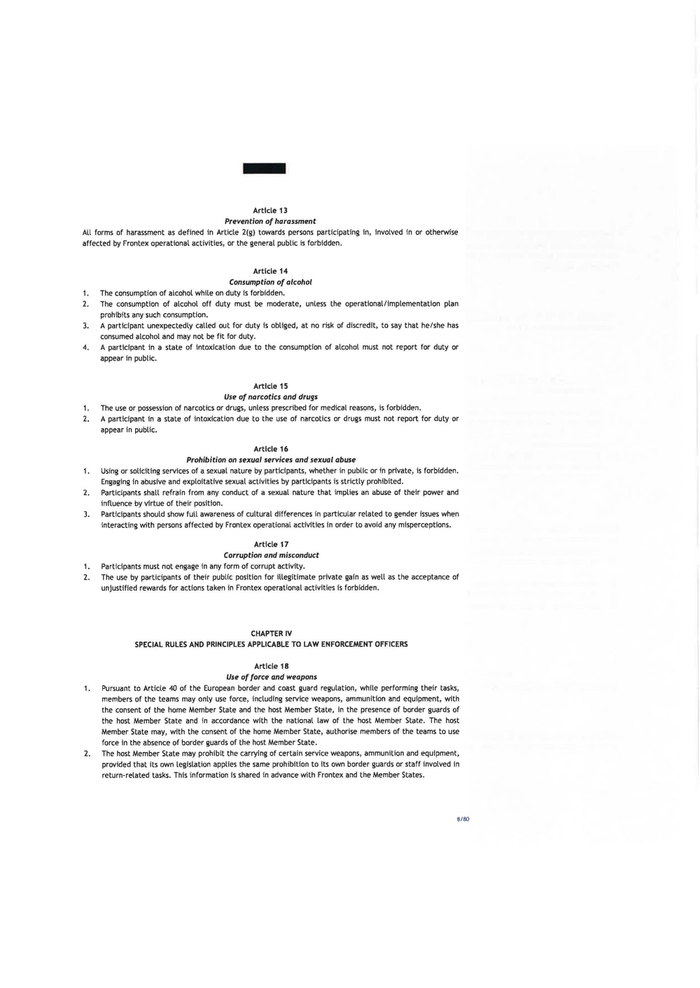
3. The use of force, and in particular of weapons, must be as a last resort and not exceed the minimum degree necessitated by the circumstances. It has to be proportionate for the performance of duties or in legitimate self-defence or in legitimate defence of other persons and must be in strict compliance with the relevant guarantees provided for in national, Union and international law. CHAPTERV FINALPROVISIONS Article 19 Awareness Participants must: (a) prior to their engagement in a Frontex operational activity, get acquainted with the content of this code of conduct, for example through appropriate means provided by national authorities responsible for the deployment of the participants or by Frontex; (b) keep themselves informed about the most up-to-date Frontex objectives, good practices and policies. Article 20 Duty to cooperate and to inform 1. Participants have the duty to cooperate in the gathering of facts of any incident which was reported during a Frontex operational activity. 2. Participants must provide information about the complaints mechanism and complaint form to any person who wants to report an alleged fundamental rights violation under that mechanism . Article 21 Sanctions 1. In the case of a violation of this code of conduct by a member of Frontex staff, the Executive Director must take adequate measures which may include the immediate removal of the member of Frontex staff from the Frontex operational activity, in accordance with the Staff Regulations ( ) and the Frontex disciplinary procedure ( ). 2. If the violation was committed by a person deployed by a Member State, the Executive Director communicates the incident to the responsible Member State. The Executive Director expects the relevant authority of the Member State to use its powers regarding the necessary disciplinary measures and, if applicable, suspend or remove the person concerned from the respective pool for a defined period. Nevertheless, if the continued engagement of this person jeopardises the Frontex operational activity in question, the Executive Director may decide to suspend or remove him or her from that activity. 9/f!IJ
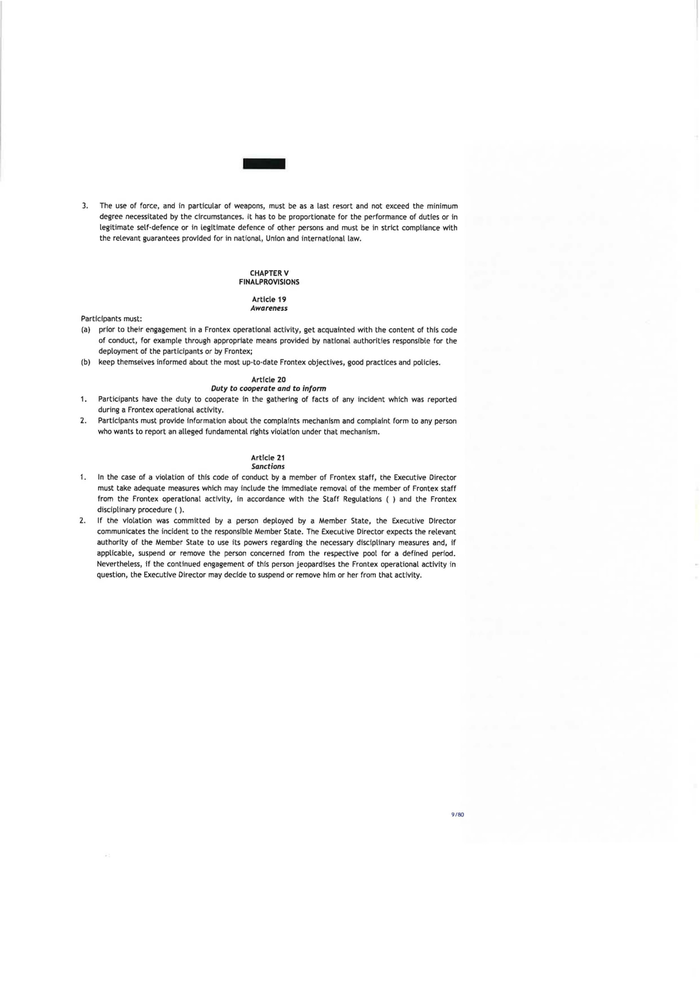
ANNEX 2 - COMPLAINTS MECHANISM Background information According to Article 72 of the European Border and Coast Guard Regulation', the Agency shall, in cooperation with the Fundamental Rights Officer (FRO), take the necessary measures to set up a complaints mechanism to monitor and ensure the respect for fundamental rights in the operational areas where the activities of the Agency are implemented. Furthermore, Article 16(3)(m) of the Regulation prescribes that the Operational Plan must lay down the procedures setting up a mechanism to receive and transmit such a complaint to the Agency. The procedures of the complaint mechanism defined in this Annex are relevant in the context of the following operational activities: (i) joint operations, (ii) pilot projects, (iii) rapid border interventions, (iv) migration management support teams deployment, (v) return operations, (vi) return interventions or (vii) rapid return interventions (hereinafter - 'the Agency activities'). Complaints include personal data and must, therefore handled with confidentially and must not be transmitted via any other channels other than those specifically designated by the complaints mechanism and established in the rules and procedures that follow. For more information on the complaints mechanism please consult the Frontex website: http://frontex.europa.eu/complalntst General information Who can submit a complaint? Any person who is directly affected by the actions of staff involved in an Agency activity and who considers him or herself to have been the subject of a breach of his or her fundamental rights due to those actions may submit a complaint. The complaint may be presented by any party representing such a person . What is the subject of the complaint? A concrete fundamental rights violation resulting from an action by participant in Agency activity. Possible ways to submit a complaint A complaint must be made in writing and may be made on the official complaint form. Although the use of the complaint form is preferable, complaints can be submitted in any format, provided that the complaint is in writing. The complainant has 4 possibilities to present a complaint: Using the official complaint form available in Frontex website Imps: 11 mlcroslte. frontex.europa. eu/ en/Complaints -ending the complaint via email to complalnts@frontex.europa.eu Sending the complaint by post: 1 ReJulatlon (EU) 201611624 of the furopt"1 Parlitment cml of lhe Cound l of 14 Septmiber 11116 Oii the furope<11 Border end Coa!t Guard (QJ L 251 , 16 09. 2016 , p. 1). 10/80
